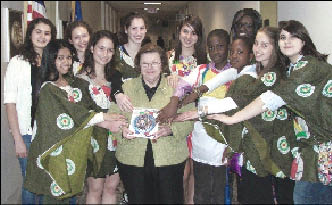Washington, D.C., and Mali, West Africa
(301) 929-8808
http://www.schoolgirlsunite.org
Objective: For young women in America and Africa to collaborate as philanthropists and political activists to advocate for gender equality, particularly girls’ access to education everywhere in the world.
 |
|
School Girls Unite members meet with Sen. Barbara Mikulski (D-Md.) outside her Washington office in April. Photo: Photo courtesy of Wendy Lesko |
In a Nutshell: Girls in the United States plan fundraisers – anything from raffles to benefit concerts – to sponsor 70 girls in Mali to go to school. A sister organization based in Mali’s capital runs the scholarship program. School Girls Unite students in the U.S. use the information they learn from the scholarship recipients in Mali – such as an 11-year-old former School Girls Unite scholarship recipient being forced to become a child bride – to inform them when urging Congress to pass the Protecting Girls by Preventing Child Marriage Act or when meeting with the Mali minister of education.
Where It Happens: Some participants meet in a classroom at their middle school, Oakland Mills Middle School in Columbia, Md., in a classroom designed for seminars with computers and video equipment. Other School Girls Unite students who attend about 12 different schools in the Washington area meet on weekends at students’ houses. The Mali group often uses the main meeting room of a nongovernmental organization or an Internet café.
When It Began: In 2004, a group of American seventh-graders and a half-dozen West African women met at a café to discuss discrimination and lack of educational opportunities for girls in developing countries. The slogan, “Give girls around the world the same chances we have,” was developed, and the organization was born.
Who Started It and Who Runs It: Wendy Lesko, founder of the Youth Activism Project, organized the initial meeting and continues to work pro bono as the program’s coordinator. School Girls Unite is entirely run by volunteers. Three students serve on the board of directors, and other School Girls Unite members take lead roles planning activities ranging from fundraising to advocacy initiatives.
Obstacles: “Strategic planning and development of a replicable model require sustained focus,” Lesko said. “Time is the major obstacle, even though the youth active with School Girls Unite are incredibly committed to this international cause.”
How They Overcame Them: “We hold ‘mega-meetings’ to allow adequate time to chill and deliberate,” Lesko said, referring to three-hour sessions that include talking, updating the website and eating. “Working in teams for specific projects reduces frustration and achieves results, including the writing and editing of our bilingual action guide, Girls Gone Activist! How to Change the World through Education. Currently we are creating an intergenerational advocacy program to engage girls with their moms, aunts or grandparents.”
Cost: Annual operating budget averages $30,000.
Who Pays: Individual donors.
Who Else Has Kicked In: School Girls Unite and the sister organization in Mali both depend on in-kind donations, including an office safe and equipment, technical assistance, and training and time volunteered by young people and adults.
Youth Served: A few boys are involved, but girls between 11 and 18 years old are the main participants. Fifty student members are active. Many parents of School Girls Unite members are from developing countries, including Bangladesh, Mali, Nigeria and Sri Lanka. Several students in Mali who received scholarships remain active with the high school and university women who lead the sister organization.
Youth Turn-On: “Friendship and solidarity with other activists, including collaborating with our ‘sisters’ in Africa, even with the language barrier and limited exchange using Skype and Facebook,” Lesko said. “Another unexpected turn-on is gaining the attention and respect from elected officials, most recently with U.S. Sen. Barbara Mikulski,” (D-Md.).
Youth Turn-Off: “Testy group dynamics with certain people who don’t step up or follow through, especially with long-term projects that take months to complete, and momentum stops,” Lesko said.
Research Shows: School Girls Unite and its sister organization in Mali won first place in innovations in Civic Participation’s Youth Global Volunteering Research Project in 2007.
What Still Gets in the Way: “Raising money for our scholarship fund can become the popular activity, because of the transformative impact for individual girls in Africa,” Lesko said. “Less familiar is advocating for legislation such as gender equality in primary and secondary school, and parents of some School Girls Unite members are reluctant for their children to get involved in the political arena.”






























